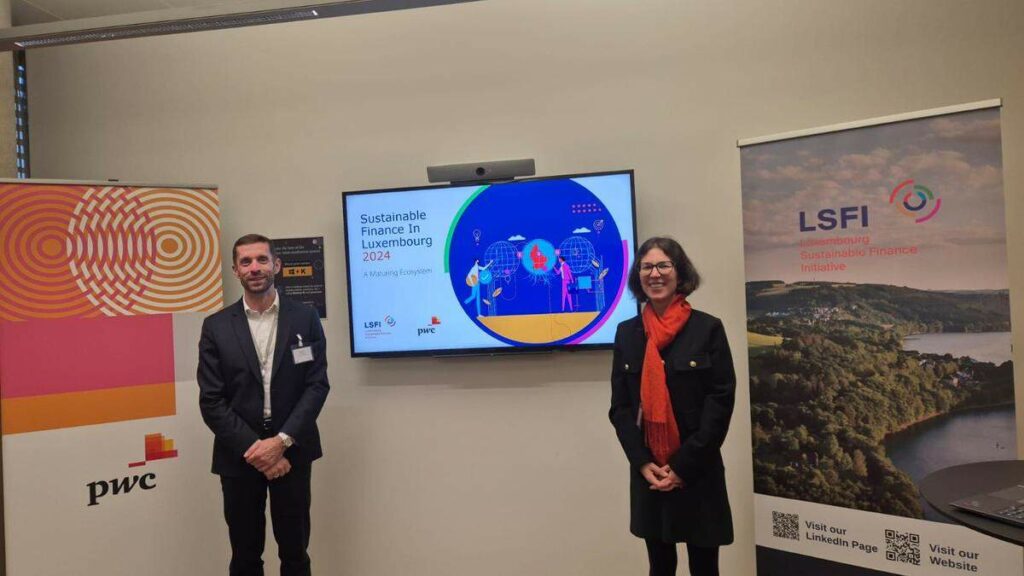Funds classified as ESG (Environmental, Social and Governance) are on the rise in Luxembourg as sustainability-related investments continue to generate significant interest, according to a new report published on Thursday by Luxembourg for Sustainable Finance Initiative (LSFI) and the big four firm PwC.
However, the report also found that only 24% of the financial market players analysed published transparency statements mandated by the Sustainable Finance Disclosure Regulation.
The total assets under management in UCITS (Undertakings for Collective Investment in Transferable Securities) classified as ESG by the report stood at €3.2 trillion at the end of June, up from €2.8 trillion last year.
The €3.2 trillion figure is about 73% of the total assets under management in Luxembourg UCITS. “This is enhanced by pioneering initiatives such as the Luxembourg Green Exchange, LuxFLAG and the International Climate Finance Accelerator, just to mention a few,” said Nicoletta Centofanti, CEO, Luxembourg Sustainable Finance Initiative.
Retail investors drove much of the ESG interest in the first half of this year, pouring €12.6 billion into funds classified as ESG, the study notes. At the same time, institutional investors were net sellers, withdrawing €7.8 billion from ESG funds.
Bond-focused ESG funds saw the highest inflows at €50.8 billion, while equity-focused funds experienced €46.3 billion in outflows, reflecting shifting preferences among investors.
Private markets driving change
Luxembourg’s private markets are also playing a growing role in sustainable finance. ESG private market funds experienced a sharp rise, with assets under management increasing from €42.9 billion in 2019 to €622.8 billion in 2023, a compound annual growth rate of 95.2%.
Also read:Clock is ticking to clean up EU’s new green rules, Luxembourg regulator warns
Private equity dominated these ESG strategies with €267.5 billion in assets under management, followed by infrastructure (€188.9 billion) and real estate (€107.7 billion).
Challenges in reporting and transparency
Despite growth, the study identifies challenges in ESG reporting, particularly regarding the Principal Adverse Impact (PAI) statements mandated by the Sustainable Finance Disclosure Regulation. Among 440 Luxembourg financial market participants analysed, only 106 published PAI reports.
Also read:Fund industry raises red flags over EU’s green rules
“Coupled with the lack of clear targets or future plans present in existing PAI disclosures – such as specific emission reduction goals by a set year – these issues affect accuracy,” the study noted.
What is an ESG fund?
For the purpose of the report, LSFI and PwC took three categories of ESG funds into account. A fund is classified as ESG by the study if any of these criteria are met:
ESG screening: Funds that explicitly apply ESG factors in their screening process
ESG exclusion: Funds that apply one or more exclusion criteria. For example, a fund that commits to not investing in weapons or tobacco or nuclear energy.
ESG involvement: Funds that apply “one or more of the following sub-strategies: best-in class, positive tilt, thematic, microfinance, SDGs, and Sustainable Bonds funds”.
In recent times, funds that describe themselves as “ESG” or “sustainable” have faced criticism for not entirely being true to their name. About half of the funds in Luxembourg that describe themselves as “sustainable”, “climate” or “ESG” invested in fossil fuels, a recent investigation by publications across Europe, including the Luxembourg Times, found.
Also read:‘Sustainable funds’ continue to invest in fossil fuels
The LSFI and PwC study acknowledges that about 9% of funds that they classify as ESG did not explicitly have any ESG involvement or ESG exclusion policies but “reportedly employ ESG screening methods in their investments”.
Measuring impact will be key
The study concludes that it is important to build on the success of Luxembourg in ESG investing.
“Beyond the observed trends, to advance further, sustained efforts will be required to address persistent challenges, particularly around data quality, standardisation, and the effective measurement of the impact of sustainable finance,” it notes.
Source link : http://www.bing.com/news/apiclick.aspx?ref=FexRss&aid=&tid=675238590c224105bed63250801f6594&url=https%3A%2F%2Fwww.luxtimes.lu%2Fluxembourg%2Fluxembourg-advances-in-esg-investing-but-transparency-gaps-persist%2F28658633.html&c=13646207790303333238&mkt=en-us
Author :
Publish date : 2024-12-05 07:03:00
Copyright for syndicated content belongs to the linked Source.
